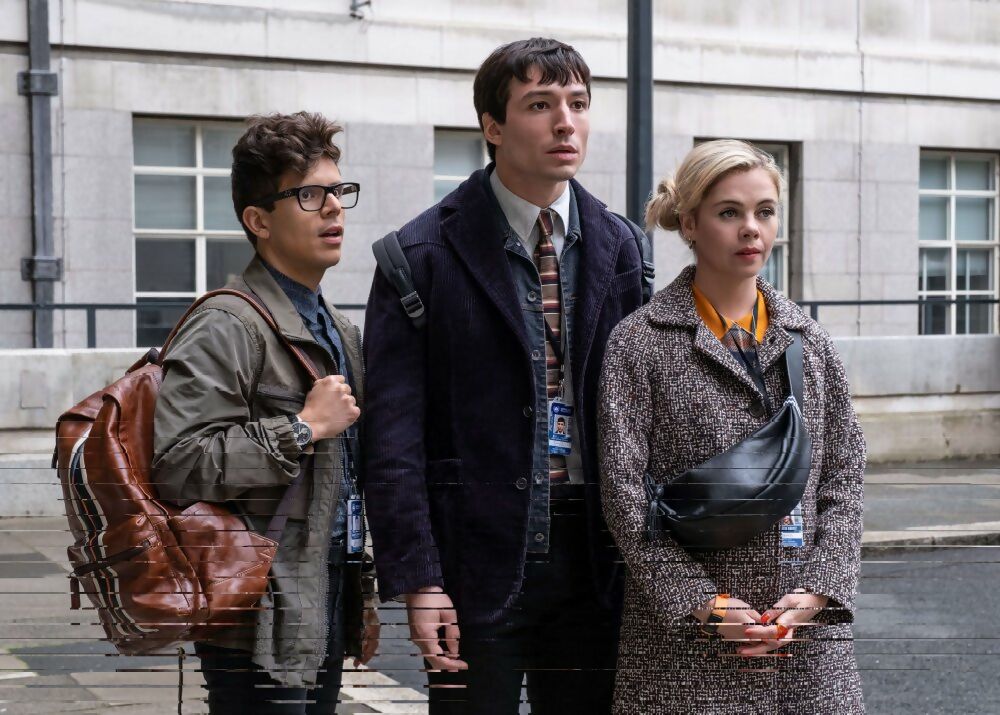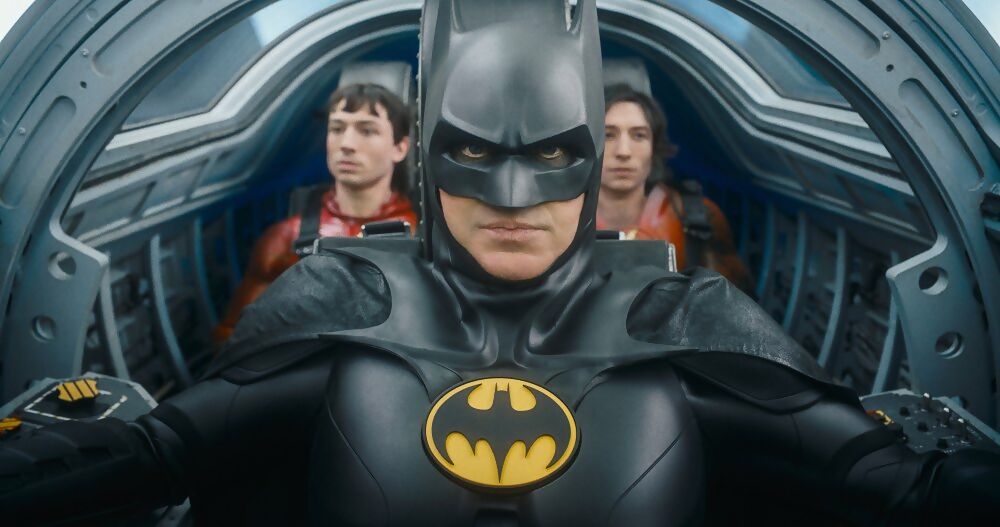
Warner Bros was facing some stark choices when it came to releasing and promoting The Flash movie. But its roll of the dice didn’t quite pay off.
It’s perhaps starting the bleedin’ obvious, but 2023’s The Flash is not one of the greatest superhero movies ever.
I note those words down as someone not particularly down on the film. Just that after I paid for my ticket, I walked past a poster declaring it as ‘one of the greatest superhero movies ever’. The last time I read that was for The Batman, and I didn’t agree with it then, either. But still: I’ll come back to that.
Instead, in the case of The Flash, I thought it was pretty decent, and for an hour of it, a whole lot of fun. I couldn’t shake the fact that that tens of millions of dollars had been sunk into jokes to satiate a very small section of the paying audience, and was curious just how that played out.
In fact, the deeper into fan service it sank, the more puzzled I got, and I must be the only person who saw it who didn’t think the return of Michael Keaton as Batman really convinced. Primarily because he didn’t seem to be playing the same character as he was in 1989 and 1992, instead a sort of heightened, more knowingly pop culture version of Bruce Wayne/Batman. But I accept I’m in the minority there.
Bottom line for me was that I felt The Flash was a fun, three-star movie. I think it’s quite hard to make a fun, three-star movie, so that’s not me aiming shade at it. Happy to debate all of this in the comments.

Outside of the film itself though, the path to The Flash’s release remains a bit of a baffling one, not least for being a movie that got through the Warner Bros Discovery system at a time it chewed up and deleted two other completed pictures. Most notably for the purposes of this piece, Batgirl, but also Scoob! Holiday Haunt.
It did so in spite of serious allegations against its star, Ezra Miller, that I won’t go into here save to acknowledge them, and note that it kept Miller away from the front line of promoting the picture.
It’s also an end of an era picture for Warner Bros. As it explored the future of its DC Comics range of tie-in movies, it had by this time hired James Gunn and Peter Safran to rip everything up and start again. The DC film universe of old was reaching its endpoint, and as audience interest seemed to decline, Warner Bros had the look of a studio who couldn’t get to the next era quickly enough.
Still, at the point Warner Bros pivoted on its DC movies, films such as The Flash and Shazam! Fury Of The Gods were way past the point of no return, and the noises from around The Flash were positive. In fact, Gunn himself was quoted back in February as saying “it’s one of the best superhero movies I’ve ever seen”, months before the rest of us got to feast eyes on it.
Gunn added too that he felt “The Flash is (“clucking” -Ed) amazing” as he enthused about the movie, seemingly appreciative of the films he’d inherited. Appreciating his viewpoint was hardly an objective one, given he was afforded the opportunity for pretty much a clean slate, this was promising.
It was interesting too that Warner Bros clearly could have just junked The Flash, and given it the same kind of treatment as Batgirl. It could have deleted the film from its servers, written the movie off against its tax bill, and simply moved on. But not only did it not do that, it also started to pump up the hype machine. It was definitely going ahead with a cinema release, and it wasn’t going to be shy about it.
The implication: the reason the film was saved, and the reason that a clearly difficult to release movie was still coming out, was because it was so good. The studio had also moved the release date forward, was expressing confidence, and it all was looking like something rather special.
This was then first put to the test with a less invested crowd at the CinemaCon convention that took place in March of 2023.
It’s hard to understate just how positive the social media noise that came out of that screening was. Sure, we should all have learnt never to trust first reactions, but so many of them – many from critics – were ecstatic. And it was one particular response, Tweeted by one particular critic that would form the cornerstone of at least the UK marketing campaign.
The Tweet, from a man called Matt Ramos, read “this is truly one of the best superhero movies ever. believe the hype. oh my god”.
I’m not linking to his account as it wasn’t his decision to take his quote and turn it into basically the thrust of the film’s poster. Warner Bros could have taken any number of ecstatic responses from that CinemaCon screening and gone with one of those.
But it didn’t. It went with his. The studio has form when it comes to using Twitter-esque responses on its posters anyway. Here, it was choosing it as the single quote.
I have no insight to what went on behind closed doors, but you could see the challenge being faced by the marketing department for the film. Putting Ezra Miller in front of reporters was an absolute no-go. Wheeling Miller out on a press tour? Absolutely not. Attending the premiere? Pushing it, but about the most it could get away with, and Miller duly showed up and said a handful of words, while people clapped.
Filmmakers – led by Andres Muschietti and Barbara Muschietti – were instead taking the lead, giving engaging, interesting interviews. Yet the film had lost a chunk of its star wattage, and couldn’t fully shed the negativity that had originally build up around it. This was a massive blockbuster movie, at least by price tag, and the studio was trying to sell it with one hand behind its back.

Warner Bros thus decided to pivot, and based its UK campaign at least around the quality of the movie itself. No wonder too, if that original feedback was to be believed.
Nobody seemed to be contradicting that narrative, either. Against this backdrop, the industry drums were beating the feeling that Warner Bros reckoned it had something very special on its hands, and was gunning for a very high opening box office weekend. Notwithstanding the fact that it struggled with Shazam! Fury Of The Gods earlier in the year, it felt that The Flash could and should cut through. The DC film it had been waiting for.
The film’s expenses were mounting up, thanks in part to a constantly revised ending that was changing in tune with where Warner Bros was planning to go with its DC movies. The bill for the final negative was reportedly topping out at over $200m, and there was a hefty promotional campaign to pay for as well.
Yet the decision looked like it was going to be vindicated. Early projections were suggesting around an $85m opening weekend in America, even though a $100m+ total would have been ideal for the studio. Still, it was opening opposite Pixar’s Elemental: not direct competition, but two big movies in one weekend.
The closer to release, the lower the projection got. Rather than heading towards Batman or Superman-style numbers, The Flash was now been pegged at Black Adam box office levels. Thing is, it didn’t even reach them.
Even @JamesGunn is head over heels over The Flash calling it one of the greatest superhero movies ever made! pic.twitter.com/p3ac60FXgX
— The Flash Film News (@FlashFilmNews) January 31, 2023
The release of the reviews from people who didn’t go to CinemaCon felt like something of a turning point. In fact, there was a teeny bit of Emperor’s New Clothes coming through in the next wave of responses.
Again, nothing out of the ordinary here. I remember watching the Tweets roll in after the world premiere of Zack Snyder’s Batman V Superman: Dawn Of Justice back in 2016, that were telling me this was something akin to one of the greatest films of all time. Then it turned out not to be one of the greatest films of all time. What we were suddenly hearing about The Flash was that, y’know, it was pretty good. What we weren’t hearing was anything really echoing the levels of confidence Warner Bros seemingly had in the film, and was paying hand over fist to advertise.
The problem at heart was this: if you’re calling something one of the greatest superhero movies of all time, or selling it widely as that, then it’d better be one of the greatest superhero movies of all time. The problem The Flash ultimately faced was that it was having to live up to a level it clearly – appreciating the film has fans – ever going to come close to.
Sure, there’s lots for fans, but if you want a $1bn-grossing film, there needs to be something more than aiming at the core fandom. Marvel’s Avengers films turned into amazing family outings, whether you were following every plotline or not. The Flash was throwing in pleasing yet narrow jokes about someone who nearly played Superman, or teasing other faces who may return. Who was it aimed at? Fans, for my money. They supported it. Not many other people did.
The poisonous ink started following quickly when the film’s box office opening weekend fell even lower than expected: $55m. Ouch. The news got worse, with the US total dropping over 70% the following weekend. Word of mouth wasn’t happening, and the film topped out at just $108m in the US. “Disaster” was the word used in more than one report, and at the very least, “crushing financial disappointment” would have to be considered. Both a little dramatic, though, and as always, there are human beings at the end of those stories.
Now before we all boo hoo on the money side: Warner Bros Discovery is a very rich company, that measures its numbers with decimal points representing lots of zeroes. It will survive. Furthermore, so will the film. Any plans for a sequel – and it was being talked up at one stage in the build-up to the movie’s release – have been quietly retired, and the film’s UK physical media debut this week has come and gone without too much of a murmur.
It’s got to this point not because the film itself was bad, I’d argue, but more as a result of how Warner Bros cornered itself: that by sticking its head down and pushing forward based on the quality of the film, it raised expectations, which in turn fuelled a level of disappointment being pointed towards a film that perhaps didn’t fully deserve it.
Ironically enough, as the studio clears the last of its current generation DC projects, it’s now facing a similar problem. Ongoing strikes by actors means that this winter’s sequel to Aquaman, starring Jason Momoa, is also likely to require a release strategy not dependent on its stars.
Aquaman & The Lost Kingdom at least has the advantage of being the sequel to a film that grossed over $1bn worldwide, and so it’s not arriving from a standing start. Still, might be wise to just dampen expectations a little this time round. The old adage: it’s better to promise less and overdeliver, than promise a lot and fall short…
—
Thank you for visiting! If you’d like to support our attempts to make a non-clickbaity movie website:
Follow Film Stories on Twitter here, and on Facebook here.
Buy our Film Stories and Film Junior print magazines here.
Become a Patron here.






